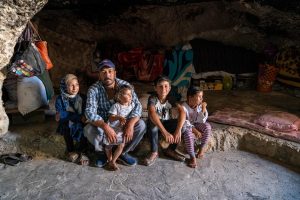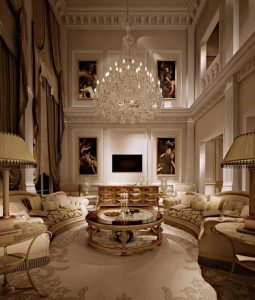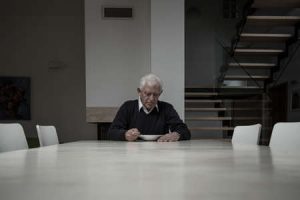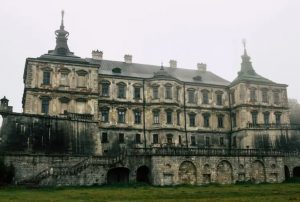Suffa lived in his cave and every day he prayed that he might somehow win the house across from him. He imagined what it would be like living in a palace, looking out across the desert  and even overlooking the cave he’d been born in and where his family had lived for generations. If he were in the mansion his life would be different. He’d be happier, more productive, have more friends, and enjoy his life. He wouldn’t be squatting in a cave with a houseful of family bickering about who needed to do the household tasks.
and even overlooking the cave he’d been born in and where his family had lived for generations. If he were in the mansion his life would be different. He’d be happier, more productive, have more friends, and enjoy his life. He wouldn’t be squatting in a cave with a houseful of family bickering about who needed to do the household tasks.
One day, the man in the mansion died, and the village was in an uproar. All were sure that the rich man’s goods would be distributed so they all came to the front gate and  stood there like they’d come to attend the wake. But Suffa was called up, and as he stood in front of the gate it opened, and only he was allowed in. he was greeted by an ancient servant, and the man handed him a letter. He was now the owner of the huge estate. It was to be his, although there were caveats in the rich man’s will. Suffa could not share his house with any but servants, and he must hoard his wealth.
stood there like they’d come to attend the wake. But Suffa was called up, and as he stood in front of the gate it opened, and only he was allowed in. he was greeted by an ancient servant, and the man handed him a letter. He was now the owner of the huge estate. It was to be his, although there were caveats in the rich man’s will. Suffa could not share his house with any but servants, and he must hoard his wealth.
In the first few weeks, he was delighted. His family came to ask for admittance and he would meet them at the gate and explain the terms of the will. His mother came to complain that the rich man had been his father, and that’s why he’d inherited the place. She asked to live with him and he had to turn her away.  That was perhaps the hardest. Suffa turned away cousins he’d barely known about, and they came up with their hands out for gifts, but his family was another matter. He thought about what they saw when they looked from the windows which used to be his. They imagined him living in luxury, and in the first weeks he poured hot baths he never stepped into, threw flower pedals on the floor to walk upon, ate meals prepared as if for a king, and sent most of it back to the kitchen. The fried fish from his cousin on the coast never made its way to his table anymore and when he reached for flat bread there were none to get there ahead of him and tear it in half to share.
That was perhaps the hardest. Suffa turned away cousins he’d barely known about, and they came up with their hands out for gifts, but his family was another matter. He thought about what they saw when they looked from the windows which used to be his. They imagined him living in luxury, and in the first weeks he poured hot baths he never stepped into, threw flower pedals on the floor to walk upon, ate meals prepared as if for a king, and sent most of it back to the kitchen. The fried fish from his cousin on the coast never made its way to his table anymore and when he reached for flat bread there were none to get there ahead of him and tear it in half to share.
By the time a month had passed he was so miserable that he began to research how the man who  claimed to be his father had lived so long in such a place. He went through papers and diaries, until happening upon a set of photos which showed the family he’d once had. The man had been photographing the cave, peering into the windows at night with a telescope, and photographing them as they sat at dinner outside. He saw pictures of himself wrapped in a blanket against the cold and looking over the children playing, him teasing his wife when she was trying to cook, and hauling loads of wood up the hill to the cave entrance. It was a life of drudgery, he knew that better than ever now that he’d experienced possession of the mansion.
claimed to be his father had lived so long in such a place. He went through papers and diaries, until happening upon a set of photos which showed the family he’d once had. The man had been photographing the cave, peering into the windows at night with a telescope, and photographing them as they sat at dinner outside. He saw pictures of himself wrapped in a blanket against the cold and looking over the children playing, him teasing his wife when she was trying to cook, and hauling loads of wood up the hill to the cave entrance. It was a life of drudgery, he knew that better than ever now that he’d experienced possession of the mansion.
His days were taken up with signing forms, with government applications and chastising servants  for doing their jobs too slow, or too fast. He was turning into the man of the big house, except that nightly he would pour over the pictures, and when the moon allowed it, he pulled the telescope from its eye on the heavens and looked into the life that had been his. His children pointed at his house in front of his wife, and even from far away her eyelashes were heavy with sorrow.
for doing their jobs too slow, or too fast. He was turning into the man of the big house, except that nightly he would pour over the pictures, and when the moon allowed it, he pulled the telescope from its eye on the heavens and looked into the life that had been his. His children pointed at his house in front of his wife, and even from far away her eyelashes were heavy with sorrow.
One night, he could endure it no more and he went into the village. He found the richest man in the  village now that his patron had died. The man who all despised because he’d robbed those who traded with him, and throw his own parents to the street to be cared for by strangers. He brought the paperwork with him, and after asking if the man would take the burden from him, he signed over the mansion to the businessman.
village now that his patron had died. The man who all despised because he’d robbed those who traded with him, and throw his own parents to the street to be cared for by strangers. He brought the paperwork with him, and after asking if the man would take the burden from him, he signed over the mansion to the businessman.
The rich man bragged about how he’d convinced the man to sell. That he’d made a bargain that was a gamble and lost, but the man who walked across the broad avenue to his cave didn’t care. His wife greeted him at the door with the sling meant for carrying wood, and he took it cheerfully with his eldest daughter.  On the way to the plateau he asked her about her hopes and dreams, about the way she imagined she would live once she were married and his age with children of her own. When she asked, he told her he couldn’t live without her any more, and that became the refrain when each person asked.
On the way to the plateau he asked her about her hopes and dreams, about the way she imagined she would live once she were married and his age with children of her own. When she asked, he told her he couldn’t live without her any more, and that became the refrain when each person asked.
He never told them of the absolute misery of the legal confines of the will, about the endless nights wondering where he belonged and why he bothered with living. He never mentioned the musket he’d taken from the wall on one particularly dark night, and how in the morning his fingers were too cramped by fear to work the trigger. Instead, he said he needed the noise of the children around him. That his missed his mother the most, his father, his uncle he barely saw, and the neighbours who let their goats out when his garden gate was open. He couldn’t live without them.
The mansion was given to person after person as accident or misadventure brought death to those who lived there. Servants avoided the place, the windows were broken by birds mistaking a reflection for the sky, and finally, the place had deteriorated so much that the man in the cave applied to have it torn down.
